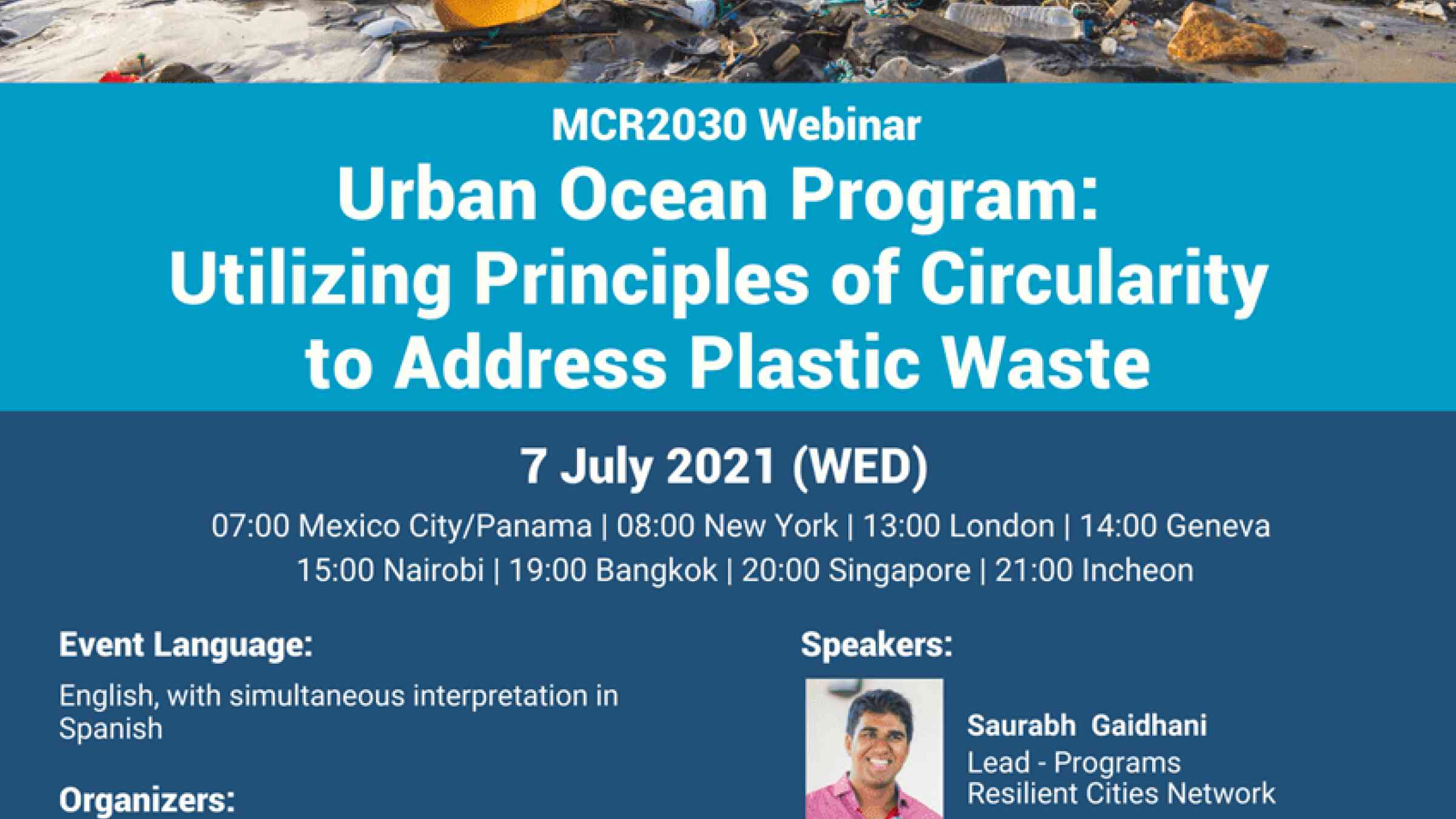[MCR2030-UNDRR-RCities] Urban Ocean Program Utilizing Principles of Circularity to Address Plastic Waste

- English
Event Description
This webinar aims to introduce Resilient Cities Network (R-Cities), one of the Core Partners of the Making Cities Resilient 2030 (MCR2030), and the Urban Ocean Program, a program that helps cities build a resilient, equitable and circular waste management system to address ocean plastic waste. It includes presentations of different methodologies and tools applied throughout the program to address the interrelated challenges of urban development and ocean plastic using a resilience lens; as well as the experiences from partners and member cities that have been actively involved in this program.
Key Content
- Introduction to Resilient Cities Network (R-Cities)
- Introduction on Urban Ocean program, its objective and purpose
- Urban Ocean Program delivery structure and available tools
- Application of Circularity Assessment protocol (CAP) tool and findings in 5 cities
- Case example of Semarang, Indonesia, in applying CAP and Opportunity Assessment Tool (OAT)
- Q&A
Speakers
- Mr. Saurabh Gaidhani, Lead - Programs, Resilient Cities Network
- Ms. Keri Browder, Cities Project Director, Ocean Conservancy
- Ms. Wiwandari Handayani, Associate Professor, Diponegoro University
- Ms. Taylor Maddalene, PhD Student, University of Georgia / Graduate Research Assistant, Jambeck Research Group
Date & Time
Date: 07 July 2021 (Wed)
Time: 7:00 Panama | 8:00 New York | 9:00 Brazil | 14:00 Geneva | 15:00 Nairobi | 19:00 Bangkok | 21:00 Incheon
Duration: 1.5 hours
Language: English, with simultaneous interpretation in Spanish
Organizers
- Resilient Cities Network (R-Cities)
- Ocean Conservancy (OC)
- New Materials Institute (NMI)
- UNDRR Global Education and Training Institute (GETI)
- Making Cities Resilient 2030 (MCR2030)
About Resilient Cities Network (R-Cities):
Resilient Cities Network is the world’s leading organization working in urban resilience. Present in more than 90 cities, 40 countries, and 6 continents, R-Cities is a global city-led nonprofit organization that brings together knowledge, practice, partnerships, and funding to empower cities to build a safe, equitable, and sustainable future for all.
About Ocean Conservancy (OC):
Ocean Conservancy is working to protect the ocean from today’s greatest global challenges. Together with our partners, we create science-based solutions for a healthy ocean and the wildlife and communities that depend on it. Since the formation of the International Coastal Cleanup in 1987, Ocean Conservancy has mobilized millions of volunteers to remove trash from beaches and waterways around the world while pioneering upstream solutions to the growing ocean plastics crisis. Ocean Conservancy invests in cutting-edge scientific research, implements on-the-ground projects, and works with conservationists, scientists, governments, the private sector and members of the public to change the plastics paradigm.
About the UNDRR Global Education and Training Institute (UNDRR GETI):
UNDRR GETI was established in 2010 to develop a new cadre of professionals in disaster risk reduction and climate change adaptation to build disaster resilient societies.
GETI has a global mandate to provide capacity building support to mainstream disaster risk reduction and climate change adaptation into sustainable development; convene and support inter-city learning to strengthen resilience (Making Cities Resilient); and to provide capacity building and best practice sharing support to national training institutions working on resilience issues.
Based in Incheon, the Republic of Korea, UNDRR GETI is also a global secretariat of the Making Cities Resilient 2030 (MCR2030).
About the Making Cities Resilient 2030 (MCR2030):
Making Cities Resilient 2030 (MCR2030) is a unique cross-stakeholder initiative for improving local resilience through advocacy, sharing knowledge and experiences, establishing mutually reinforcing city-to-city learning networks, injecting technical expertise, connecting multiple layers of government and building partnerships.
Through delivering a clear 3-stage roadmap to urban resilience, providing tools, access to knowledge and monitoring and reporting tools, MCR2030 will support cities on their journey to reduce risk and build resilience.
MCR2030 aims to ensure cities become inclusive, safe, resilient and sustainable by 2030, contributing directly to the achievement of Sustainable Development Goal 11 (SDG11) “Make cities and human settlements inclusive, safe, resilient and sustainable”, and other global frameworks including the Sendai Framework for Disaster Risk Reduction, the Paris Agreement and the New Urban Agenda.
Visit mcr2030.undrr.org for more information.
For more information:
- MCR2030 Global Secretariat at [email protected]
- Nikki Rudnick, Global Communications Lead at [email protected]

